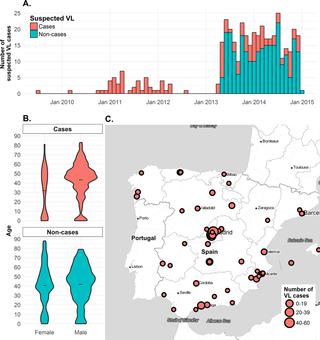PLOS Neglected Tropical Diseases ( IF 3.4 ) Pub Date : 2018-03-01 , DOI: 10.1371/journal.pntd.0006277 Mathieu Bangert , María D. Flores-Chávez , Ivonne P. Llanes-Acevedo , Carolina Arcones , Carmen Chicharro , Emilia García , Sheila Ortega , Javier Nieto , Israel Cruz

|
Background
Visceral leishmaniasis (VL), the most severe form of leishmaniasis, is endemic in Europe with Mediterranean countries reporting endemic status alongside a worrying northward spread. Serological diagnosis, including immunochromatographic test based on the recombinant antigen rK39 (rK39-ICT) and a direct agglutination test (DAT) based on the whole parasite antigen, have been validated in regions with high VL burden, such as eastern Africa and the Indian subcontinent. To date, no studies using a large set of patients have performed an assessment of both methods within Europe.
Methodology/Principal findings
We selected a range of clinical serum samples from patients with confirmed VL (including HIV co-infection), Chagas disease, malaria, other parasitic infections and negative samples (n = 743; years 2009–2015) to test the performance of rK39-ICT rapid test (Kalazar Detect Rapid Test; InBios International, Inc., USA) and DAT (ITM-DAT/VLG; Institute of Tropical Medicine Antwerp, Belgium). An in-house immunofluorescence antibody test (IFAT), was included for comparison. Estimated sensitivities for rK39-ICT and DAT in HIV-negative VL patients were 83.1% [75.1–91.2] and 84.2% [76.3–92.1], respectively. Sensitivity was reduced to 67.3% [52.7–82.0] for rK39 and increased to 91.3% [82.1–100.0] for DAT in HIV/VL co-infected patients. The in-house IFAT was more sensitive in HIV-negative VL patients, 84.2% [76.3–92.1] than in HIV/VL patients, 79.4% [73.3–96.2]. DAT gave 32 false positives in sera from HIV-negative VL suspects, compared to 0 and 2 for rK39 and IFAT, respectively, but correctly detected more HIV/VL patients (42/46) than rK39 (31/46) and IFAT (39/46).
Conclusions/Significance
Though rK39-ICT and DAT exhibited acceptable sensitivity and specificity a combination with other tests is required for highly sensitive diagnosis of VL cases in Spain. Important variation in the performance of the tests were seen in patients co-infected with HIV or with other parasitic infections. This study can help inform the choice of serological test to be used when screening or diagnosing VL in a European Mediterranean setting.
中文翻译:

rK39免疫色谱试验和直接凝集试验在西班牙地中海内脏利什曼病诊断中的验证
背景
内脏利什曼病(VL)是最严重的利什曼病形式,在欧洲很流行,地中海国家报告其特有地位,并担心北方蔓延。血清学诊断,包括基于重组抗原rK39的免疫色谱试验(rK39-ICT)和基于整个寄生虫抗原的直接凝集试验(DAT),已在东非和印度次大陆等高VL负担地区进行了验证。迄今为止,在欧洲范围内,还没有使用大量患者的研究对这两种方法进行评估。
方法/主要发现
我们从确诊为VL(包括HIV合并感染),恰加斯病,疟疾,其他寄生虫感染和阴性样品(n = 743; 2009–2015年)的患者中选择了一系列临床血清样本,以测试rK39-ICT的性能快速测试(Kalazar Detect快速测试;美国InBios International,Inc.)和DAT(ITM-DAT / VLG;比利时安特卫普热带医学研究所)。为了进行比较,还包括内部免疫荧光抗体测试(IFAT)。HIV阴性VL患者对rK39-ICT和DAT的估计敏感性分别为83.1%[75.1-91.2]和84.2%[76.3-92.1]。HIV / VL合并感染患者的rK39敏感性降低至67.3%[52.7-82.0],DAT敏感性提高至91.3%[82.1-100.0]。内部IFAT在HIV阴性VL患者中较敏感,为84.2%[76.3-92.1],而在HIV / VL患者中为79.4%[73.3-96.2]。
结论/意义
尽管rK39-ICT和DAT表现出可接受的敏感性和特异性,但在西班牙高度敏感的VL病例诊断仍需要与其他检测结合使用。在合并感染艾滋病毒或其他寄生虫感染的患者中观察到了测试性能的重要变化。这项研究可以帮助告知在欧洲地中海环境中筛选或诊断VL时应使用的血清学检测方法。











































 京公网安备 11010802027423号
京公网安备 11010802027423号